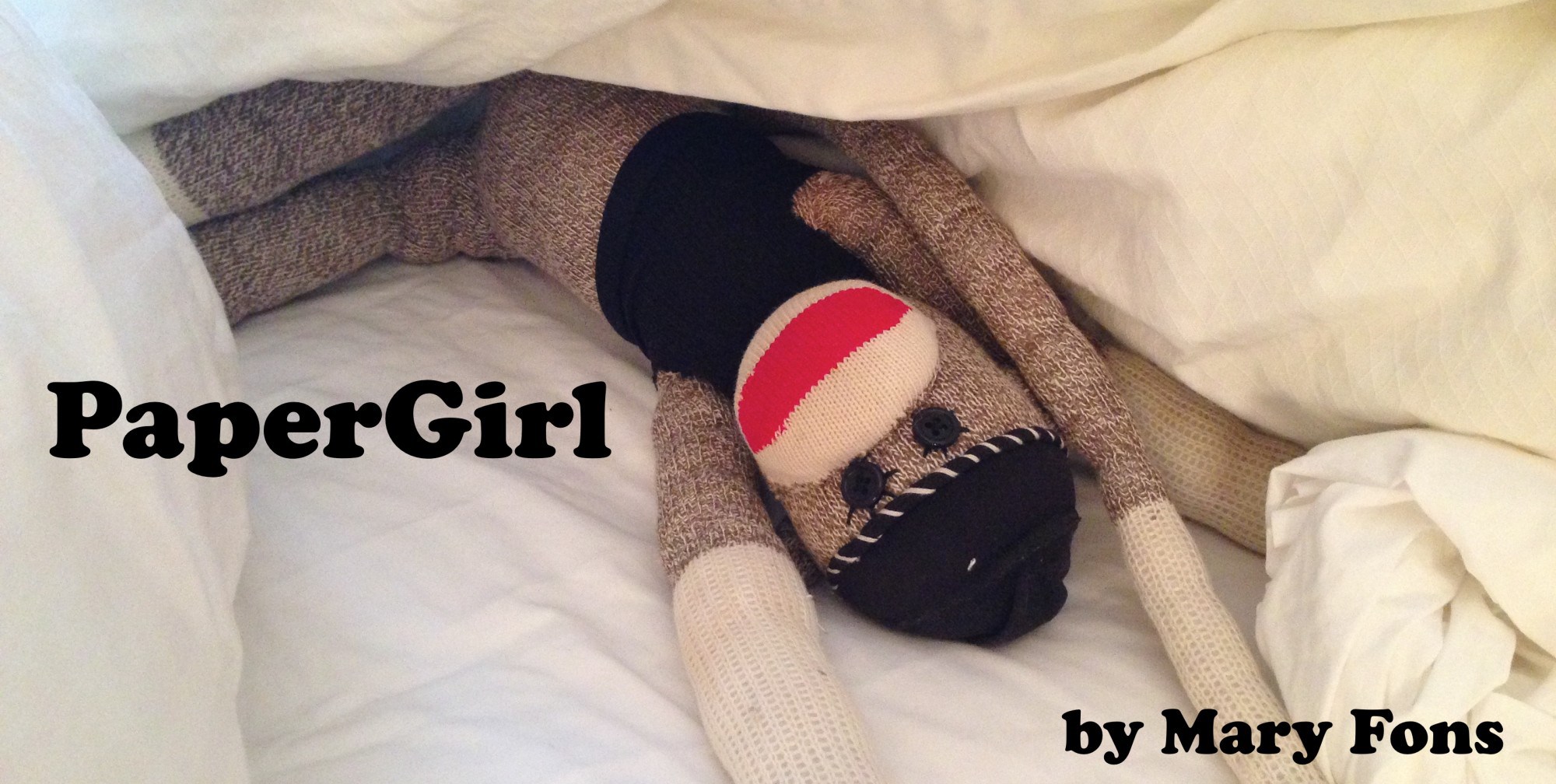

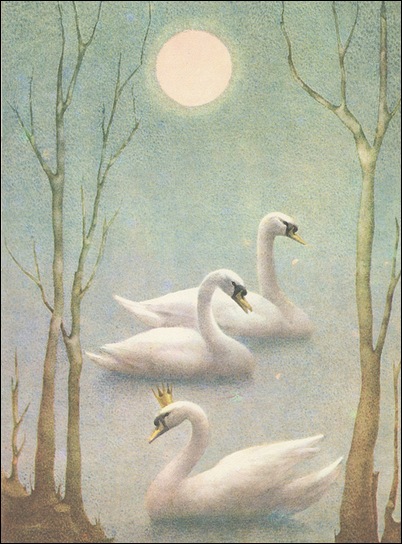
I am watching swans.
We’re here at the Island cottage to enjoy Thanksgiving. We call our place Sunrise Cottage because it’s on the easternmost side of the island and the house is all window on its east side, so when the sun comes up over Lake Michigan, the house is bathed in gold and white palomino sparkles. There is pecan pie on the counter this morning, there is a turkey brining in the dining room, but it has been snowing through the night; there is no sun.
There is instead a steely, ice crystal sky that blends with Lake Michigan at the horizon so that the whole world is just a big bowl of winter. And I am looking out at all of it from the sun porch, swaddled in jammies and a robe, a down comforter and two quilts piled on me. I’m a soldier this holiday: I took the couch on the porch so that the friends who joined us this year could have their own bedrooms. My seemingly selfless act is really not, though. Even if I have to wear two pairs of socks out here, this is the best room in the house.
I woke up pre-dawn and made a pot of coffee. As I was drinking it, looking out, the world began to lighten and I sat up in my nest. There were huge white birds out on the water, swimming between the ice floes that had formed already. Were they…? No. They were geese. Surely. They couldn’t be… Mom had gotten up by then and was in the next room, but there are many people still asleep in this house. I called, softly:
“Mama?”
“Yes?” she called back, also softly.
“Mama, do we have swans?”
“Yes.” Mom padded onto the porch. “Are they out there?” I nodded and pointed, and we looked out at the white-gray world, at a pair of the devastatingly elegant birds floating along, languidly inserting and re-inserting their necks into the freezing water. Breakfast comes to Door County.
“They look like ice,” I whispered.
“They look like pillowcases,” Mom whispered back.
This Thanksgiving, my family is up here in a snow globe. We’ve got love, victuals, a collectively wicked sense of humor, liquor, and freaking swans. I’m happy. It is my fondest wish that you feel happy today, too.
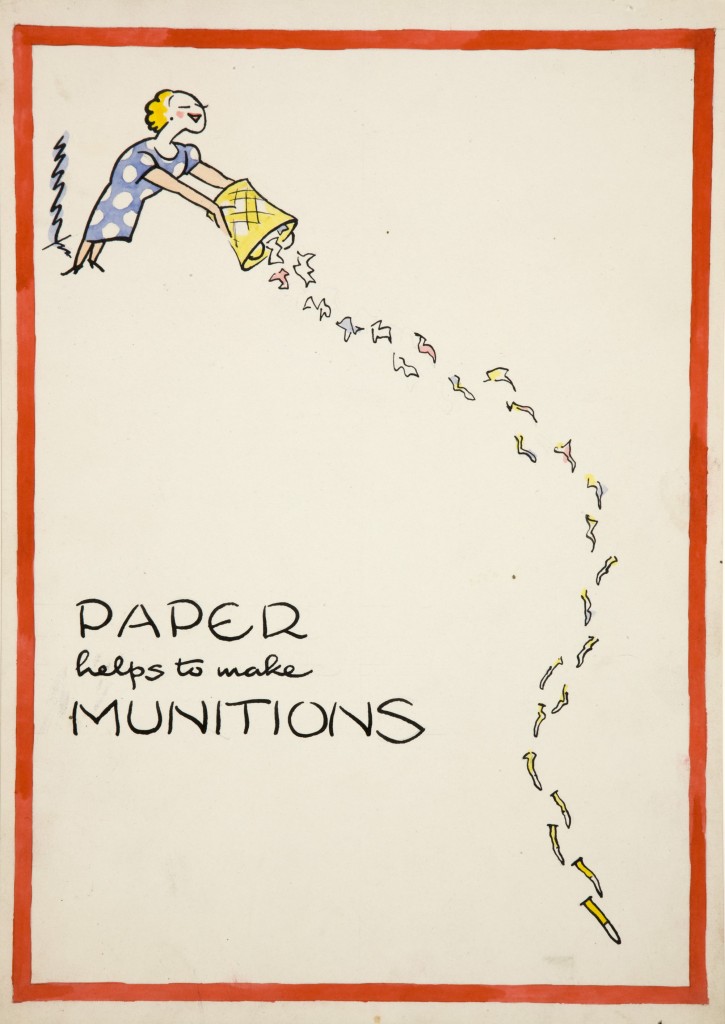
“Why’s it called ‘PaperGirl,’ grandma?”
“Sit on my knee, child, and I’ll tell you.”
“Can I have a another cooky first? You tell long stories.”
“Here. Anything else?”
“No.”
“Good. Okay, then, PaperGirl. Well, once upon a time, long ago, I wrote a poem.”
“What was it called?”
“I’m getting to it. It was called ‘The Paper Poem,’ and it was an extended metaphor about the nature of existence being fragile like paper, but beautiful, too, like paper is beautiful.”
“What’s paper?”
“Before your time.”
“Oh. Your poem sounds cool, grandma.”
“I liked it. Other people liked it, too, and I performed it in many places all over the country.”
“Like in Bismark?”
“No, never actually in Bismark, I don’t think. Maybe. It was a long time ago. Anyway, there’s a verse where I say ‘I will be your paper girl,’ and that’s where ‘PaperGirl’ comes from.”
“What’s the verse?”
“You want to hear the whole verse?”
“Is it long?”
“No, it’s not long. It’s the second-to-last verse of the poem and it goes like this:
But if you are a paper doll, too, then I shall know you on sight,
And if you are with me, come with me tonight; I will match up our bodies
by the tears in our arms —
We will form paper barricades against matchstick harm;
I will make paper love to you for as long as I can in this shreddable world;
I will be your paper girl.
“That’s nice, grandma.”
“Thanks.”
“And you named your blog that because of that poem?”
“Yes. And PaperGirl is the name of my LLC, too. And that small island I bought. And the Beaux Arts building you like so much in Paris. And my foundation in Dubai and all the vineyards in Spain. Everything in my empire, it’s all under the PaperGirl umbrella.”
“I wanna go to the zoo and see a rhinoceros.”
“Get your coat.”
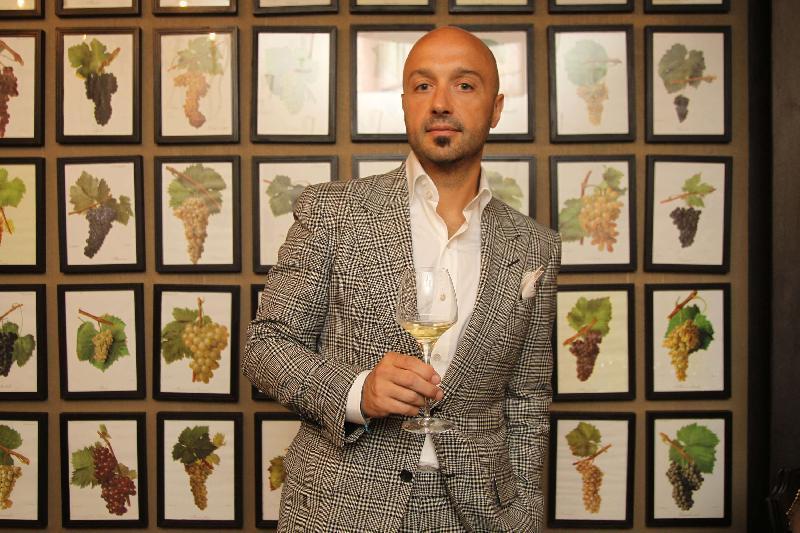
There are a handful of moments in my life that could be described as “smooth.” When playing Trivial Pursuit once, I was asked, “Who was the Duke of Flatbush?” and without missing a beat I replied, “Levi Strauss?” My sister actually shot Mountain Dew out her nose. And in Las Vegas once, I winked at a man before he shot dice at the craps table and he won an enormous pile of money. These are the moments we cling to when we realize we’ve had a shred of Kleenex hanging out our nose for the better part of the afternoon.
Well, I was real smooth last night. With a celebrity.
I was walking to dinner with Yuri. We were on Michigan Avenue and turned onto Ohio, where I noticed the banners for Eataly. Eataly is chef Mario Batali’s death star, an enormous, multi-level Italian restaurant/marketplace that first opened in New York City. At Eataly, you can have a fishbowl-size glass of wine, buy imported salami, sit down to dinner, and then be rolled out the door by attractive young people in chic aprons who will give you a cannoli for the road. And we’re getting an Eataly here, on Ohio and Michigan, and ours will actually be bigger than New York’s, coming in at 63,000 square feet to Union Square’s runty 50,000. Doors open next week.
Yuri and I were arm-in-arm (it was freezing) and I see the Eataly banners; as we pass the first bank of papered-up windows, I see standing under the entrance a man I recognize to be Joe Bastianich. I recognize him because Joe Bastianich is famous. He owns vineyards and produces fine wines; he is one of three celebrity judges on popular television program Master Chef; and he’s a restauranteur titan who aside from having his own 3- and 4-star joints scattered ’round the globe, works closely with chefs — such as Mario Batali of Eataly. Joe Bastianich was standing under the eaves of his new restaurant, presumably waiting to meet someone. Maybe his wife, maybe his buddy, maybe God. He’s a very important guy.
I see him, he sees me see him. With nary a pause in my gait (and without breaking from Yuri), I glance up at the Eataly banner above us and go, “How’s it goin’ in there?” And Joe Bastianch looks a little surprised, like maybe he should know me, and he goes, “It’s good.” He looked at me again, closer, but he can’t place me.
I was like, so cool at that moment I felt I could speak for the entire city of Chicago, so as I pass him, like over my shoulder, I go, “We’re looking forward to it.”
“Me, too,” says Joe Bastianich, and Yuri and I just keep on a’walkin.
“Who was that?” Yuri asked me. Yuri doesn’t watch Master Chef.
“That was a famous man,” I said with a tiny little bunny hop, allowing myself to finally geek out. Being smooth with a celebrity is tough for one simple reason: broad exposure in television, print, and film makes a human being seem like an alien life-form that can eternally replicate itself. We would all act a little weird around a replicating alien if we met one, so that’s why it’s weird to see Madonna hailing a taxi, or Igor Stravinsky eating at Jimmy John’s. Or Joe Bastianich checking his text messages on Ohio Street.
Mr. Bastianich, you don’t know me. And I am not nearly as cool as I may have appeared last night. But Chicago is looking forward to Eataly and I can speak for the city when I say welcome, sir.*
Cin-cin.
*Mary Fons may be reached for gift cards, exclusive wine tastings, and general VIP treatment at Eataly via the contact form on this website. Thank you. — The Management
It’s time for a dispatch from everyone’s favorite fake, one-topic photo journal, The Pendennis Observer. If you missed the mission of The Pendennis Observer or would like a refresher before you see pictures of my sock monkey, please visit the first post here.
Of course, if your clicker is tired, you don’t have to go anywhere. All you need to know is that Pendennis is my monkey, I’m too old to still have him “in play” in my home/bed, I love him, and I never, ever pose him. I leave the monkey where he lay and I frequently take his picture because he is exquisite. A little funny, a little tragic, Pendennis and his gestures are life itself.
A few recent discoveries:

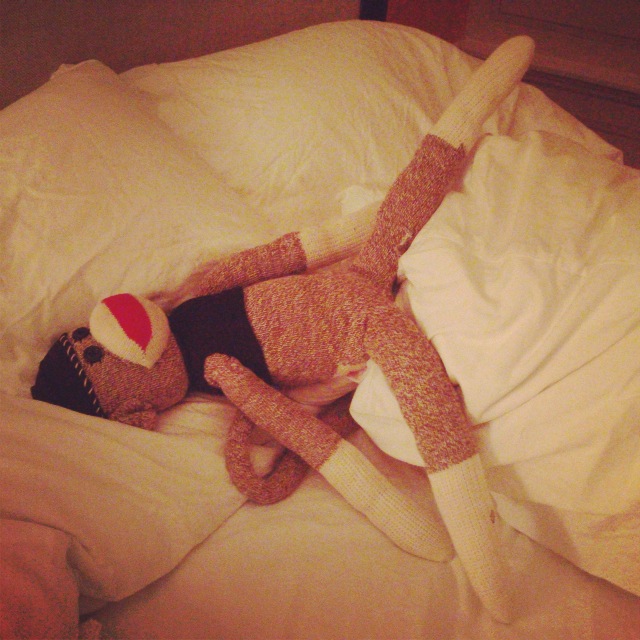
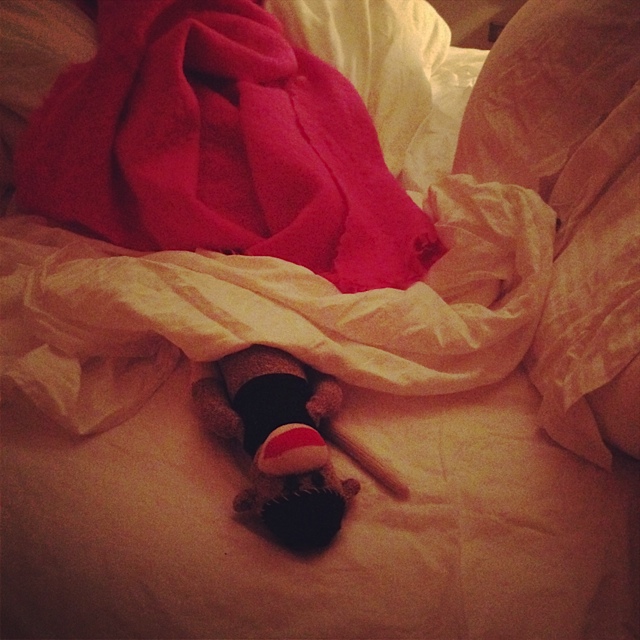

I read Virginia Woolf for the first time a few months ago. Can you believe I never read any Virginia Woolf until a few months ago? If you’ve never read any, it’s time. She’s pretty good.
I selected two pieces: a short essay entitled On Being Sick and the surprisingly slender A Room of One’s Own. Did you know that A Room of One’s Own is a speech? Well, it’s an essay she wrote with material from lectures she gave at Cambridge back in the 1920s, but to me, that makes it kind of a speech and therefore awesomely immediate. Both texts were packed with stunning, thought-provoking, clever, frequently charming prose. Virginia had the gift, man. In On Being Ill, she describes people who fall sick for long stretches thusly:
“We raise our feet even an inch above the ground on another, we cease to be soldiers in the army of the upright; we become deserters. They march to battle. We float with the sticks on the stream; helter-skelter with the dead leaves on the lawn…”
“The armies of the upright”?! Just head-slappingly good. But when I read Room, I learned something that truly blew my mind.
The phrase “a room of one’s own” is deployed with enough regularity that few native-born English speakers would go, “Whuh?” if someone dropped it into conversation. Your friend Stu might say, for example, “You know, I just need a couple weeks to chill. Do some journaling, cook, rest. Like, in a little cabin in the woods or something. A room of one’s own, you know?” And you would know what Stu is saying. He craves privacy and meditation time. He needs space and time, to turn off the cell phone and the email. A room of Stu’s own.
Some of us will know that Woolf’s concept of “a room of one’s own” was shared within the context of speaking about women — specifically, women writers. Her point is that women who want to write need space, few distractions; they need their independence.
Well.
That’s not the whole quote, folks. Virginia Woolf didn’t say that a woman who wants to write needs “a room of one’s own,” no she did not. This is what she said:
“A woman must have money and a room of her own if she is to write fiction.”
Money and a room! Money and a room of her own. Do you realize how freaking important that is to what she’s saying? It changes everything! Having a dumb room is going to work for about two seconds unless you’ve got some scratch. Where is this room? Floating in space? No! It’s in a building! With heat and water to pay for, I’d wager! And how ‘ya gonna eat, child?? You need bread! Butter! Chocolate eclairs! How can you write anything of consequence if you’re starving and how can you write anything of consequence with pizzaz if you can’t buy yourself a damned eclair every once in awhile? Good grief! Virginia got it — she knew where the bakery was.
So re-learn the Woolf quote. It’s not just that a woman writer must have space. She has to have means, as well, and that idea raises curtains in the brain to let in magnificent, dazzling light. Money and a room of one’s own. Zowie.
Bonus quote expose: I recently came across this famous piece from Thomas Jefferson, which you will surely recognize: “What country before ever existed a century and a half without a rebellion? …The tree of liberty must be refreshed from time to time with the blood of patriots and tyrants.”
You know that one. But there’s another line. That’s not the whole quote. Check it:
“What country before ever existed a century and a half without a rebellion? …The tree of liberty must be refreshed from time to time with the blood of patriots and tyrants. It is its natural manure.”
Word Nerd, over and out. You’re welcome!